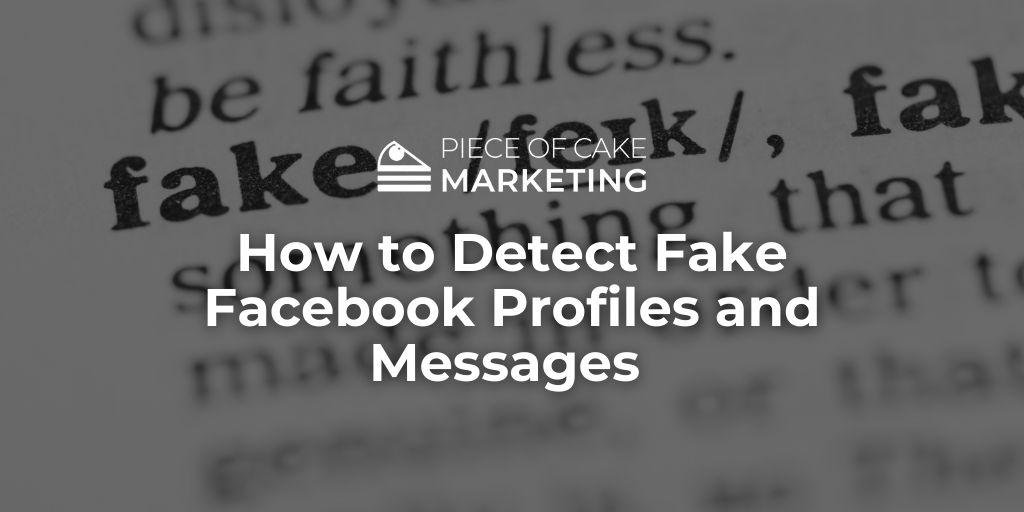In the 21st century social media platforms like Facebook foster endless opportunities for connection and community. However, the rise of fake profiles and dubious messages has also enabled deception on an unprecedented scale. As scammers leverage social platforms to manipulate users, being able to detect fake Facebook profiles and phishing attempts is crucial.
In the next few paragraphs we will equip you with actionable tips to spot deceitful accounts and messages, empowering you to protect your personal information, data, and online interactions.
The most important thing to know is that Facebook wouldn’t message you to shut down or temporarily pause your page. It would be a notification in the app.

Red Flags to Look For in Fake Facebook Profiles
Here are telltale signs that a Facebook profile may not be authentic:
1. Generic Profile Photo – Imposters often use stock model photos or stolen pictures as profile images. Profile photos that seem overly polished or don’t match the name may be red flags.
2. Minimal Account Activity – Authentic profiles have a history of posts, comments and interactions. Fake profiles often have sparse or zero activity.
3. Vague or Missing “About” Details – Legitimate users share background details in their “About” section. Sparse or overly vague “About” sections should raise suspicions.
4. Friends and Followers – Check who has liked and followed the profile. Fake accounts tend to quickly amass followers, often from different countries, who are also likely fakes.
5. Copied, Irrelevant or Suspicious Posts – Unlike authentic users who share personal thoughts, fakes rehash content from elsewhere online. Posts may seem randomly generic or reference money-making schemes.
6. Brand New Profile – Fake profiles are often recently created for the purpose of scamming. New profiles with no authentic history or connections may be dubious.
7. Profile Claiming to be a Public Figure or Facebook / Meta – Scammers often impersonate celebrities, politicians and other public figures. Verify blue check marked profiles.
8. Relationship Status Changed Quickly – Fraudsters hack legitimate accounts and quickly switch relationship statuses to “Married” to appear genuine.
9. Evidence of Profile Name Change – Imposters sometimes create fakes using inactive or compromised legitimate accounts. Check name change histories.
How to Detect Fake Facebook Messages and Communication
Here are warning signs with incoming Facebook messages and chats:
1. Message from Unknown Person – Beware of messages from people not on your friend list, especially if requests seem random or eager to connect immediately.
2. Suspicious Links in Messages – Fake accounts send links to phishing sites to steal data. Never click unfamiliar links. Hover over them to inspect the actual URL.
3. Requests for Personal Information – Scammers use messaging to directly request sensitive info like passwords or bank details. Never provide such data.
4. Messages Appearing Too Good to Be True – Messages promising prizes, easy money or free gifts aim to lure recipients to malicious sites. Remain sceptical of anything sounding unrealistic.
5. Pressuring Language and Threats – Phishing attempts often use language creating false urgency like account deactivation threats. Disregard such coercive messages.
6. Poor Grammar and Spelling – Messages from overseas scammers often contain grammar, spelling and formatting errors. While not definitive, treat such messages cautiously.
7. Sudden Changes in Messaging Behaviour – Hacked accounts may start behaving irregularly. Sudden flattery and requests for favours and money indicate possible hacking.
8. Romance Scam Tactics – Some fake accounts feign romantic interest to manipulate victims. Be cautious of excessively eager admirers professing love too quickly. Here are some examples of fake messages…

On this next message they have changed the name around.

On this message they have tried to use a genuine link to a Facebook article to get you to reply.

Protect Yourself from Online Deception
Stay vigilant using these precautionary online safety tips:
– Enable two-factor authentication on your accounts for extra login security.
– Adjust privacy settings to limit your online visibility. Never publicly share personal details.
– Verify blue check-marked accounts of public figures to avoid impersonation scams.
– Don’t open links or attachments from unknown sources. Use URL inspection tools to detect suspicious links.
– Don’t send money or sensitive data to strangers online regardless of their story.
– Cross-reference identities through mutual connections and other social platforms before engaging.
– Report fake profiles, suspicious behaviour and phishing attempts to Facebook immediately.
Running Facebook Competitions Safely
Hosting a contest on Facebook presents a fun opportunity to interact with your audience and showcase your brand. However, it’s important to remain cautious, as some may try to cheat or scam their way to prizes. Thankfully, reputable contest platforms offer capabilities to safeguard your promotion, so you can focus on driving authentic engagement versus policing fraud. Find out more about running a competition here.
Mitigating the Risks
The digital world enables meaningful connections but also harbours risks of deception. By honing your ability to detect fake Facebook profiles and dubious communication attempts, you can enjoy online interactions while protecting your personal data and privacy. Always remember – if something seems questionable, proceed with caution. Your online safety comes first.
Working with Piece of Cake Marketing
Are you looking to enhance your marketing and social media presence? We’ve got you covered. Drop us an email at hello@pieceofcakemarketing.co.uk and let’s discuss how we can help you in taking your business to new heights.
Whether you need guidance on developing a comprehensive marketing strategy or require hands-on support with social media management, we can help.
Contact Emma on 07799626332.
